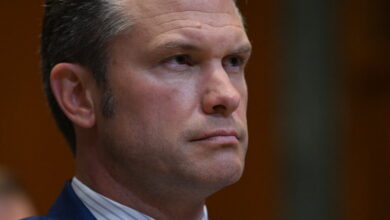Trump Administration Slashes Research Into L.G.B.T.Q. Health

The Trump administration has scrapped more than $800 million worth of research into the health of L.G.B.T.Q. people, abandoning studies of cancers and viruses that tend to affect members of sexual minority groups and setting back efforts to defeat a resurgence of sexually transmitted infections, according to an analysis of federal data by The New York Times.
In keeping with its deep opposition to both diversity programs and gender-affirming care for adolescents, the administration has worked aggressively to root out research touching on equity measures and transgender health.
But its crackdown has reverberated far beyond those issues, eliminating swaths of medical research on diseases that disproportionately afflict L.G.B.T.Q. people, a group that comprises nearly 10 percent of American adults.
Of the 669 grants that the National Institutes of Health had canceled in whole or in part as of early May, at least 323 — nearly half of them — related to L.G.B.T.Q. health, according to a review by The Times of every terminated grant.
Federal officials had earmarked $806 million for the canceled projects, many of which had been expected to draw more funding in the years to come.
Scores of research institutions lost funding, a list that includes not only White House targets like Johns Hopkins and Columbia, but also public universities in the South and the Midwest, like Ohio State University and the University of Alabama at Birmingham.
At Florida State University, $41 million worth of research was canceled, including a major effort to prevent H.I.V. in adolescents and young adults, who experience a fifth of new infections in the United States each year.
In termination letters over the last two months, the N.I.H. justified the cuts by telling scientists that their L.G.B.T.Q. work “no longer effectuates agency priorities.” In some cases, the agency said canceled research had been “based on gender identity,” which gave rise to “unscientific” results that ignored “biological realities.”
Other termination letters told scientists their studies erred by being “based primarily on artificial and nonscientific categories, including amorphous equity objectives.”
The cuts follow a surge in federal funding for L.G.B.T.Q. research over the past decade, and active encouragement from the N.I.H. for grant proposals focused on sexual and gender minority groups that began during the Obama administration.
President Trump’s allies have argued that the research is shot through with ideological bias.
“There’s been a train of abuses of the science to fit a preconceived conclusion,” said Roger Severino of the Heritage Foundation, the conservative think tank that helped formulate some Trump administration policies.
“And that was based on an unscientific premise that biology is effectively irrelevant, and a political project of trying to mainstream the notion that people could change their sex.”
Scientists said canceling research on such a broad range of illnesses related to sexual and gender minority groups effectively created a hierarchy of patients, some more worthy than others.
“Certain people in the United States shouldn’t be getting treated as second-class research subjects,” said Simon Rosser, a professor at the University of Minnesota whose lab was studying cancer in L.G.B.T.Q. people before significant funding was pulled.
“That, I think, is anyone’s definition of bigotry,” he added. “Bigotry in science.”
The canceled projects are among the most vivid manifestations of a broad dismantling of the infrastructure that has for 80 years supported medical research across the United States.
Beyond terminating studies, federal officials have gummed up the grant-making process by slow-walking payments, delaying grant review meetings and scaling back new grant awards.
Bigger changes may be in store: Mr. Trump on Friday proposed reducing the N.I.H. budget from roughly $48 billion to $27 billion, citing in part what he described as the agency’s efforts to promote “radical gender ideology.”
The legality of the mass terminations is unclear. Two separate lawsuits challenging the revocation of a wide range of grants — one filed by a group of researchers, and the other by 16 states — argued that the Trump administration had failed to offer a legal rationale for the cuts.
The White House and the Department of Health and Human Services did not respond to requests for comment.
Andrew Nixon, a spokesman for the health department, told The Daily Signal, a conservative publication, last month that the move “away from politicized D.E.I. and gender ideology studies” was in “accordance with the president’s executive orders.”
The N.I.H. said in a statement: “N.I.H. is taking action to terminate research funding that is not aligned with N.I.H. and H.H.S. priorities. We remain dedicated to restoring our agency to its tradition of upholding gold-standard, evidence-based science.”
The L.G.B.T.Q. cuts ended studies on antibiotic resistance, undiagnosed autism in sexual minority groups, and certain throat and other cancers that disproportionately affect those groups. Funding losses have led to firings at some L.G.B.T.Q.-focused labs that had only recently been preparing to expand.
The N.I.H. used to reserve grant cancellations for rare cases of research misconduct or possible harm to participants. The latest cuts, far from protecting research participants, are instead putting them in harm’s way, scientists said.
They cited the jettisoning of clinical trials, which have now been left without federal funding to care for volunteer participants.
“We’re stopping things that are preventing suicide and preventing sexual violence,” said Katie Edwards, a professor at the University of Michigan, whose funding for several clinical trials involving L.G.B.T.Q. people was canceled.
H.I.V. research has been hit particularly hard.
The N.I.H. ended several major grants to the Adolescent Medicine Trials Network for H.I.V./AIDS Intervention, a program that had helped lay the groundwork for the use in adolescents of a medication regimen that can prevent infections.
That regimen, known as pre-exposure prophylaxis, or PrEP, is credited with helping beat back the disease in young people.
Cuts to the program have endangered an ongoing trial of a product that would prevent both H.I.V. and pregnancy and a second trial looking at combining sexual health counseling with behavioral therapy to reduce the spread of H.I.V. in young sexual minority men who use stimulants.
Together with the termination of dozens of other H.I.V. studies, the cuts have undermined Mr. Trump’s stated goal from his first term to end the country’s H.I.V. epidemic within a decade, scientists said.
The N.I.H. terminated work on other sexually transmitted illnesses, as well.
Dr. Matthew Spinelli, an infectious disease researcher at the University of California, San Francisco, was in the middle of a clinical trial of doxycycline, a common antibiotic that, taken after sex, can prevent some infections with syphilis, gonorrhea and chlamydia.
The trial was, he said, “as nerdy as it gets”: a randomized study in which participants were given different regimens of the antibiotic to see how it is metabolized.
He hoped the findings would help scientists understand the drug’s effectiveness in women, and also its potential to cause drug resistance, a concern that Secretary of State Marco Rubio had voiced in the past.
But health officials, citing their opposition to research regarding “gender identity,” halted funding for the experiment in March. That left Dr. Spinelli without any federal funding to monitor the half-dozen people who had already been taking the antibiotic.
It also put the thousands of doses that Dr. Spinelli had bought with taxpayer money at risk of going to waste. He said stopping work on diseases like syphilis and H.I.V. would allow new outbreaks to spread.
“The H.I.V. epidemic is going to explode again as a result of these actions,” said Dr. Spinelli, who added that he was speaking only for himself, not his university. “It’s devastating for the communities affected.”
Despite a recent emphasis on the downsides of transitioning, federal officials canceled several grants examining the potential risks of gender-affirming hormone therapy. The projects looked at whether hormone therapy could, for example, increase the risk of breast cancer, cardiovascular disease, altered brain development or H.I.V.
Other terminated grants examined ways of addressing mental illness in transgender people, who now make up about 3 percent of high school students and report sharply higher rates of persistent sadness and suicide attempts.
For Dr. Edwards, of the University of Michigan, funding was halted for a clinical trial looking at how online mentoring might reduce depression and self-harm among transgender teens, one of six studies of hers that were canceled.
Another examined interventions for the families of L.G.B.T.Q. young people to promote more supportive caregiving and, in turn, reduce dating violence and alcohol use among the young people.
The N.I.H. categorizes research only by certain diseases, making it difficult to know how much money the agency devotes to L.G.B.T.Q. health. But a report in March estimated that such research made up less than 1 percent of the N.I.H. portfolio over a decade.
The Times sought to understand the scale of terminated funding for L.G.B.T.Q. medical research by reviewing the titles and, in many cases, research summaries for each of the 669 grants that the Trump administration said it had canceled in whole or in part as of early May.
Beyond grants related to L.G.B.T.Q. people and the diseases and treatments that take a disproportionate toll on them, The Times included in its count studies that were designed to recruit participants from sexual and gender minority groups.
It excluded grants related to illnesses like H.I.V. that were focused on non-L.G.B.T.Q. patients.
While The Times examined only N.I.H. research grants, the Trump administration is also ending or considering ending L.G.B.T.Q. programs elsewhere in the federal health system. It has proposed, for example, scrapping a specialized suicide hotline for L.G.B.T.Q. young people.
The research cuts stand to hollow out a field that in the last decade had not only grown larger, but also come to encompass a wider range of disease threats beyond H.I.V.
Already, scientists said, younger researchers are losing jobs in sexual and gender minority research and scrubbing their online biographies of evidence that they ever worked in the field.
Five grants obtained by Brittany Charlton, a professor at the Harvard School of Public Health, have been canceled, including one looking at sharply elevated rates of stillbirths among L.G.B.T.Q. women.
Ending research on disease threats to gender and sexual minority groups, she said, would inevitably rebound on the entire population. “When other people are sick around you, it does impact you, even if you may think it doesn’t,” she said.
Irena Hwang contributed reporting.




